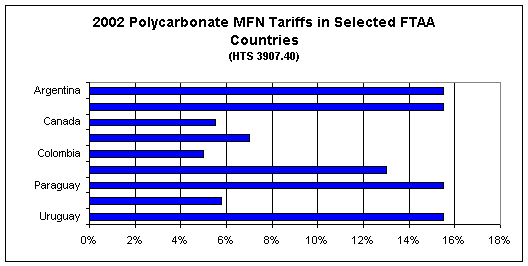| Free Trade Area of the Americas - FTAA |

|
Declarations |
Committee |
Committees |
Facilitation |
Society |
Database |
Cooperation Program |
||||
|
|||||||||||
|
Public FTAA -
COMMITTEE OF GOVERNMENT REPRESENTATIVES ON THE PARTICIPATION OF
CONTRIBUTION IN RESPONSE TO THE OPEN AND ONGOING INVITATION
Bayer Polymers June 3, 2003
Chair of the Committee of Government Representatives on the
Participation of Civil Society
Re: Request to the Negotiating Group on Market Access for
Immediate FTAA-wide Elimination of Tariffs on Polycarbonate (HTS 3907.40)
Dear Sir or Madam:
Bayer Corporation (“Bayer”) welcomes the opportunity to
respond to your Open Invitation to Civil Society in FTAA Participating Countries
and contribute its views to the Committee of Government Representatives on the
Participation of Civil Society. Bayer directs its comments to the Negotiating
Group on Market Access and respectfully requests reciprocal immediate tariff
elimination on polycarbonate (HTS 3907.40) as a key objective of market access
negotiations for a Free Trade Area of the Americas (“FTAA”).
About Bayer and the US Industry
Bayer, headquartered in Pittsburgh, Pennsylvania, markets a
wide variety of health care and chemical products and is a wholly-owned
subsidiary of the Germany-based Bayer Group. Other major US polycarbonate
manufacturers include GE Plastics and Dow Chemical. Combined, the industry
operates manufacturing facilities in the states of Alabama, Indiana, and Texas.
About Polycarbonate
Polycarbonate is a high-performance resin used to manufacture
products with diverse applications, including optical, medical, automotive, and
electronic equipment. For example, polycarbonate is a key component used to
manufacture blood dialysis equipment, compact discs and DVDs, and bottles and
containers.
Tariff Elimination Benefits All FTAA Countries
Reciprocal and immediate FTAA-wide elimination of
polycarbonate tariffs would result in widespread benefits for all member
countries. Manufacturing in the optical, electronics, and health care industries
stand to benefit directly, resulting in the creation of thousands of well-paying
jobs. Competitive polycarbonate costs will also improve: (1) the competitive
position of FTAA-member country exports in world markets; and (2) the
competitive position of domestic production in these same products relative to
non-FTAA imports, such as those from Europe and Asia. Western Hemisphere
consumers will also greatly benefit from competitive prices on electronic,
optical, automotive, and health care equipment as well as containers.
High Hemispheric Tariffs Discourage Value-Added Manufacturing
High hemispheric polycarbonate tariffs constitute a
substantial barrier to the numerous downstream industries in FTAA countries that
utilize polycarbonate. 2002 MFN tariff rates on polycarbonate in selected FTAA
countries range from 5% in Colombia up to 15.5% in Brazil. A patchwork of
preferential systems can significantly reduce the polycarbonate tariff in
intra-FTAA trade or eliminate it completely. For example, polycarbonate imports
from FTAA countries enter the US duty-free under NAFTA and other preferential
trade programs. All intra-Mercosur trade is likewise duty-free; however,
non-Mercosur imports face the 15.5% MFN tariff. These preferences
notwithstanding, a patchwork system that keeps some rates high and others low is
highly inefficient and should be replaced with uniform duty elimination.
Notably, of the 34 FTAA negotiating partners, five countries - Argentina,
Brazil, Canada, Mexico, and the United States - currently produce polycarbonate.
 Conclusion Immediate reciprocal polycarbonate tariff elimination is a win-win for all FTAA-member countries. It will directly direct benefit value-added industries that employ thousands of highly-paid workers and increase the competitiveness of member country industries in world export markets. It will also benefit the millions of consumers of optical, medical, automotive, and electronic products made with polycarbonate through more affordable prices. Bayer thanks you again for this opportunity to directly contribute to the FTAA process. Sincerely, Head of Performance Materials Division |
|
|
|
|
|
||